COMPOSTING BASICS
COMPOSTING BASICS
All the Skills and Tools You Need to Get Started
2nd edition
Eric Ebeling
with Carl Hursh and Patti Olenick
STACKPOLE BOOKS
Guilford, Connecticut
STACKPOLE BOOKS
Published by Stackpole Books
An imprint of Globe Pequot
Trade Division of The Rowman & Littlefield Publishing Group, Inc.
4501 Forbes Boulevard, Suite 200, Lanham, Maryland 20706
Distributed by
NATIONAL BOOK NETWORK
800-462-6420
Copyright 2017 Stackpole Books
Photos by Alan Wycheck unless otherwise credited. Photos on pages vii, 1, 6, 7, 8, 16, 18, 20, 24, 66, 86, 88, 91, 96, and 116 provided by Thinkstock. Photos on pages 10, 17, 22, 32, 82, 100, 113, 114, and 131 provided by iStock. Photos on pages 4, 5, 20, 27, and 28 provided by Shutterstock.
All rights reserved. No part of this book may be reproduced in any form or by any electronic or mechanical means, including information storage and retrieval systems, without written permission from the publisher, except by a reviewer who may quote passages in a review.
British Library Cataloguing in Publication Information Available
Library of Congress Cataloging-in-Publication Data
Names: Ebeling, Eric, editor.
Title: Composting basics : all the skills and tools you need to get started / Eric Ebeling, editor ; Carl Hursh, environmental educator and consultant ; Patti Olenick, soil scientist and consultant ; photographs by Alan Wycheck.
Other titles: Basic composting.
Description: 2nd edition. | Guilford, Connecticut : Stackpole Books, [2017] | First edition published 2003 is titled: Basic composting. | Includes bibliographical references and index.
Identifiers: LCCN 2016055510 (print) | LCCN 2016056916 (ebook) | ISBN 9780811718370 (pbk. : alk. paper) | ISBN 9780811765671 (e-book)
Subjects: LCSH: Compost. | Organic fertilizers.
Classification: LCC S661.B38 2017 (print) | LCC S661 (ebook) | DDC 631.8/75--dc23
LC record available at https://lccn.loc.gov/2016055510
 The paper used in this publication meets the minimum requirements of American National Standard for Information SciencesPermanence of Paper for Printed Library Materials, ANSI/NISO Z39.48-1992.
The paper used in this publication meets the minimum requirements of American National Standard for Information SciencesPermanence of Paper for Printed Library Materials, ANSI/NISO Z39.48-1992.
CONTENTS
ACKNOWLEDGMENTS
T his book was a collaborative effort by so many talented people, and I hope I have managed to remember everyone who helped. My apologies to anyone I omitted.
My gratitude to: Alan Wycheck of Wycheck Photography in Harrisburg, Pennsylvania, whose skill behind the lens once again captured my vision for a book; Carl Hursh, whose composting skills are eclipsed perhaps only by his talents with homemade salsa; Patti Olenick, for shining her light through some dense material; Jina Padilla of Pennsylvania State Parks, whose keys unlocked a few important doors; Daniel Dindal, for the use of his classic illustration inside the common compost pile; Alison Abolins and Andy Goodwin, who donated their backyard as a shooting locale; Ed Abolins, problem-solver extraordinaire, for going that extra mile; Tim Maro, assistant manager and director of public works for the borough of Camp Hill, Pennsylvania, for making the time; and last, but far from least, my wife Andrea and son Alec, who somehow manage to teach me something new every dayeven after all these years.
INTRODUCTION
Y ou dont need a science degree or a shed full of sophisticated equipment to make quality compost. All you need is some know-how, a pile of organic materials, and a little bit of elbow grease. Nature does the rest.
The dark, rich soil covering the forest floor is a great example of this natural process in action. Fallen leaves blanket the dead limbs, plants, and other vegetation already on the ground. Over time, this mixture of materials breaks down into smaller and smaller pieces as millions of tiny organisms eat it, digest it, and convert it to waste. Think of these hungry decomposers as natures cleanup crew.
Eventually this layer of decaying leaves and plants becomes a carpet of lush humus loaded with nutrients. New plants, shrubs, and trees take root and flourish in this rich material, and the natural cycle continues.
The process is much the same when you compost in your backyard.
The word compost comes from the Latin for to put together, and that is quite literally what you have to doput together the correct amounts of unwanted yard waste, food scraps, and other organic items; manipulate environmental factors to accelerate natural decomposition; and make compost for use in flower beds, gardens, lawns, or anywhere you would use fertilizer or mulch.
The basic composting processes detailed in this book require no highly advanced skills to complete successfully. Keep in mind that this book was not conceived to be a dense technical manual on the science behind composting. Rather, this book contains all of the essential information you need to know, presented clearly for ease of understanding.
The projects contained herebuilding your own composting bin and screener, for instancerequire only common tools and a basic understanding of how to use them. You do not need to be a carpenter or a skilled handyman for these do-it-yourself suggestions.
Compost acts as a slow-release fertilizer, providing a wide range of nutrients, enzymes, and vitamins over time that plants need to stay healthy and flourish. Microorganisms in the compost allow these nutrients to be absorbed more readily into the plants. Most finished compost contains a pH level that is almost neutralmeaning it is neither too acidic nor too alkaline. A majority of plants respond well to soil with a neutral pH, and this can give your plants, shrubs, and lawn a more lush appearance. Whats more, the natural properties of compost eliminate the need for harsh and expensive lawn chemicals that can adversely affect the environment.
ACT NATURALLY
Chances are, because you hold this book in your hand, you already have made the decision that composting is right for you. Just in case you have any doubts about the benefits of compostingfrom both a personal and a larger ecological standpointconsider these facts:
Compost is less expensive than conventional fertilizer and mulch. Other than a few basic startup costs, the investment needed is a little time and a minimum of labor. Compare that with the price of a pound of fertilizer, and the savings are obvious.
Fresh compost has been called a gardeners best friend. Compost improves the texture of any kind of soilsilty, sandy, hard, looseand allows it to hold more water or to drain more efficiently. It basically replenishes the living part of the soil to make it a healthy, productive environment so plant roots can grow and thrive.
Beneficial insects, earthworms, and other small creatures find compost to be an appealing habitat, and they can aid plant growth by creating underground passageways for air, water, and nutrients to get to plant roots. Experienced gardeners know that the presence of hearty earthworms is a true sign of healthy soil.


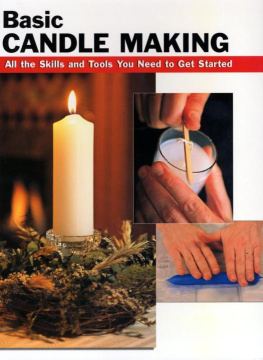
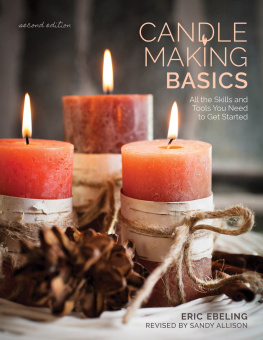
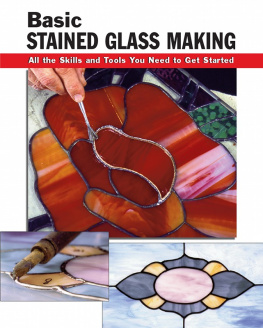
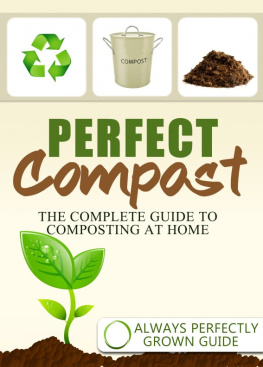
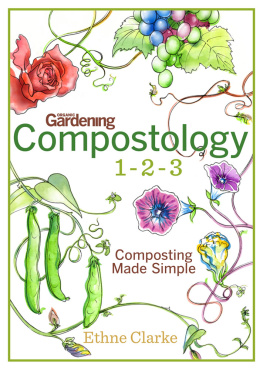
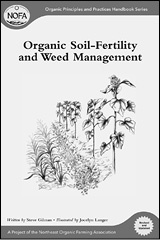
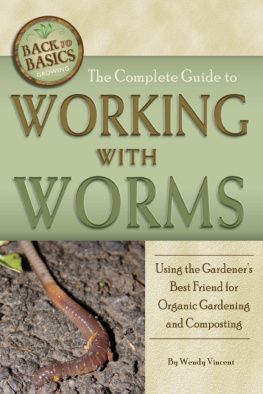
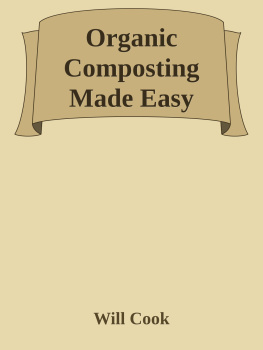
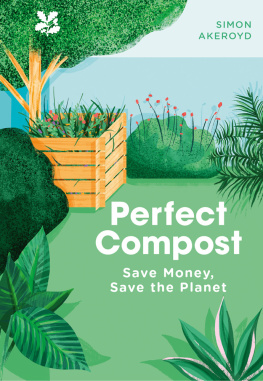
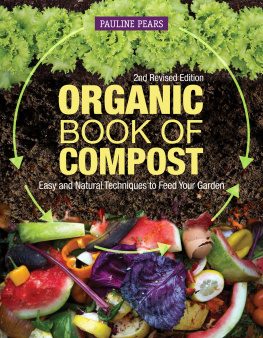
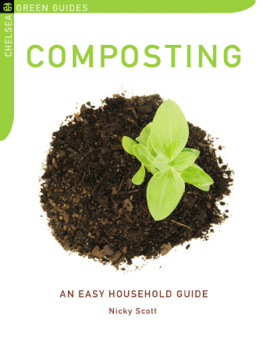
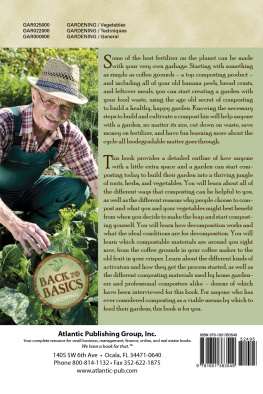
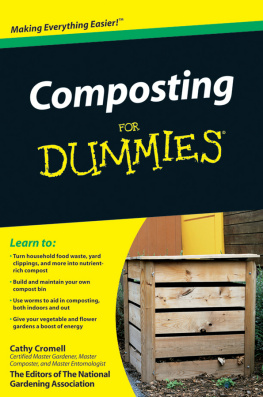

 The paper used in this publication meets the minimum requirements of American National Standard for Information SciencesPermanence of Paper for Printed Library Materials, ANSI/NISO Z39.48-1992.
The paper used in this publication meets the minimum requirements of American National Standard for Information SciencesPermanence of Paper for Printed Library Materials, ANSI/NISO Z39.48-1992.

